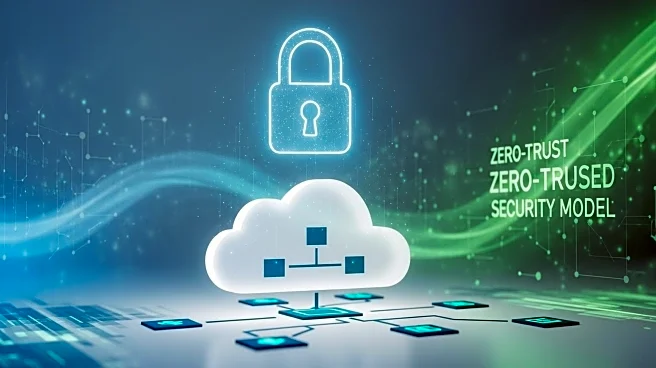What is the story about?
What's Happening?
Zscaler, a cloud-first security company, is promoting the adoption of zero trust principles to enhance security in increasingly distributed cloud environments. Dhawal Sharma, Executive Vice President of Product & Product Strategy at Zscaler, emphasizes that traditional security measures, such as firewalls, are becoming obsolete as applications and data are more widely distributed. The zero trust model requires continuous verification of identities, workloads, and data movements, rather than relying on perimeter-based security. Zscaler's platform supports real-time validation and risk assessment, offering a scalable solution for organizations expanding globally. The company is also preparing for future security challenges, such as post-quantum cryptography, and is integrating AI to improve data loss prevention and threat detection.
Why It's Important?
The shift to zero trust security models is crucial as organizations increasingly rely on cloud-based services and remote work environments. This approach addresses the limitations of traditional security measures, which are less effective in protecting against modern threats that exploit distributed networks. By adopting zero trust, organizations can reduce vulnerabilities associated with user access and data movement, potentially lowering the risk of breaches. Zscaler's focus on AI and machine learning further enhances its ability to detect and prevent threats, offering a proactive security solution. As quantum computing advances, the company's preparation for post-quantum security ensures long-term protection for sensitive data.
What's Next?
Zscaler plans to roll out decryption for post-quantum ciphers, ensuring its platform remains secure against emerging threats. The company is also exploring agentic AI, which could revolutionize identity and authorization frameworks in cloud services. As organizations continue to adopt cloud-based solutions, Zscaler's zero trust architecture is positioned to support secure operations and scalability. The ongoing development of AI-driven security measures will likely enhance the platform's ability to prevent data breaches and improve overall cybersecurity.
Beyond the Headlines
The adoption of zero trust models represents a significant shift in cybersecurity philosophy, moving away from perimeter-based defenses to continuous verification. This change reflects broader trends in digital transformation, where flexibility and scalability are prioritized. The integration of AI and machine learning in security platforms highlights the growing importance of automation in threat detection and prevention. As organizations navigate the complexities of cloud environments, zero trust offers a robust framework for maintaining security without compromising operational efficiency.
















